
Digital banking is becoming a must-have for any bank today, and providing strong digital services is an avid expectation from customers, not an additional feature anymore. Recently, we sat down with Mr. Sudesh Khaling, the CEO of Everest Bank to learn his views on digital credit, security, and more.
Mr. Khaling has over three decades of experience in banking and has worked in Class A institutions such as Standard Chartered and Laxmi Bank. He was the director of Citizens Bank prior to his appointment at Everest Bank and is the first Nepali CEO of Everest Bank.
“Post Covid-19 Pandemic outbreak, the demand for digital/online banking platforms saw a huge development in Nepal. Traditionally banks were or are offering internet or online banking to customers to access their accounts for transactional activities such as checking balances and statements, making online payments and paying bills, etc. The trend as we see today has completely changed with customers now moving from internet banking to mobile or digital banking which offers seamless 24-hour-a-day access to various banking services including Foneloan.
The recent Nepal Rastra Bank data on digital payments shows a huge increase in its use over the years. In terms of payments, using various electronic and/or digital channels such as Connect IPS, mobile banking, wallets, internet banking, QR codes, etc, there has been an increase of about NPR 49 billion during the month of Bhadra, 2079 alone as compared to the same month last year.
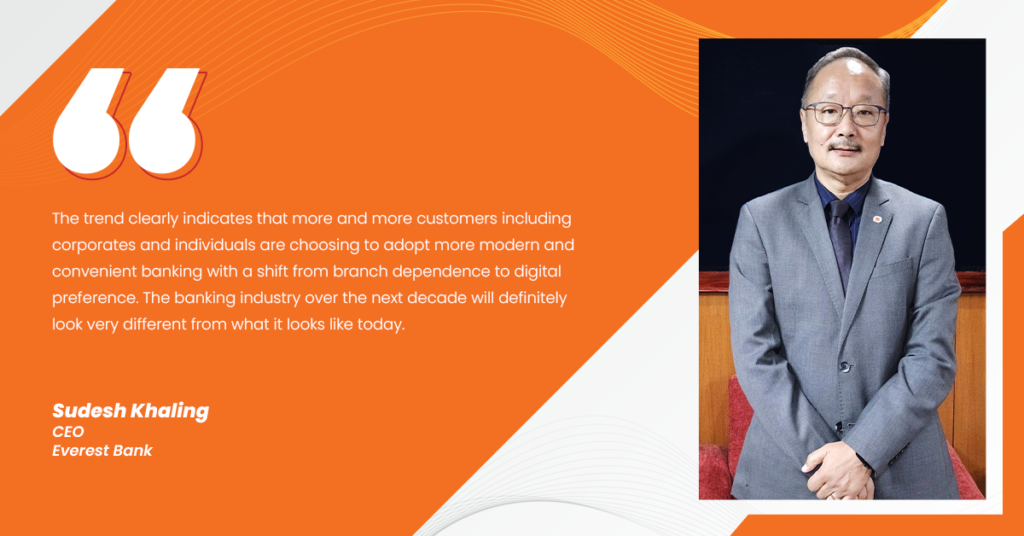
The trend clearly indicates that more and more customers including corporates and individuals are choosing to adopt more modern and convenient banking with a shift from branch dependence to digital preference. The banking industry over the next decade will definitely look very different from what it looks like today. Tomorrow we may not need so many branches to drive market exposure, increase customer acquisitions, and support deposit growth when the customer has the convenience of uninterrupted banking services on their mobile phones. Physical branches will perhaps be replaced by e-lounges, kiosks, ATMs, etc.”
“The transformation and transition to digital banking we are witnessing today in Nepal is largely attributed to Nepal Rastra Bank’s intentional drive and need for banks to provide safer yet convenient banking access to its customer during the Covid pandemic. We must thank the current Governor of Nepal Rastra Bank, Shree Maha Prasad Adhikari for his personal interest and effort in promoting digital banking.
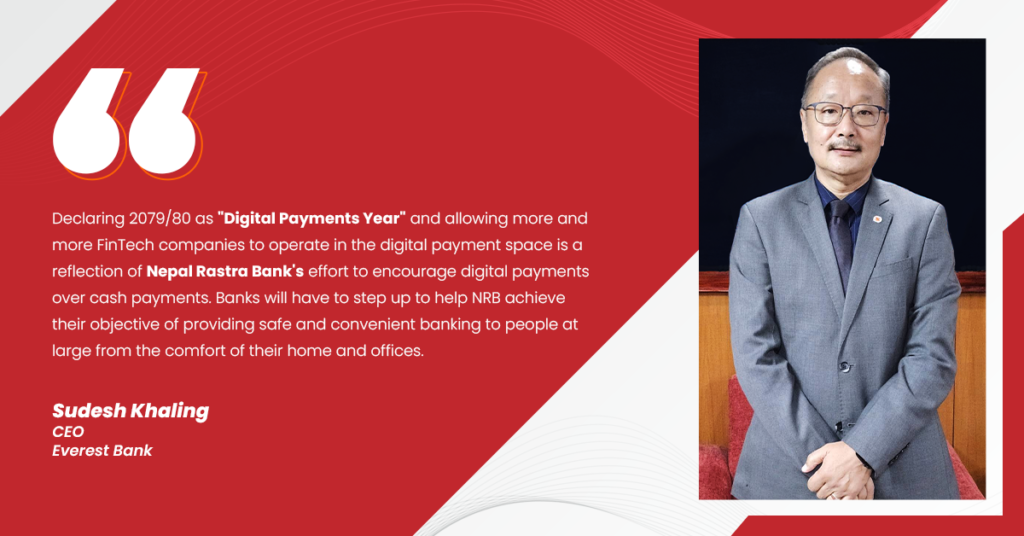
Declaring 2079/80 as “Digital Payments Year” and allowing more and more FinTech companies to operate in the digital payment space is a reflection of Nepal Rastra Bank’s effort to encourage digital payments over cash payments. Banks will have to step up to help NRB achieve its objective of providing safe and convenient banking to people at large from the comfort of their homes and offices.
The regulatory framework on digital banking is ever-evolving with ongoing technology transformation and the introduction of new digital products and services. Whilst NRB will continue to come up with new regulations as they identify emerging risks in digital banking but they have always been kind enough to invite banks for discussion before issuing fresh guidelines.
This has surely helped banks to better understand and comply with regulations.”
“We embarked on our digital banking journey about 3 years ago when we first introduced online customer onboarding. It currently entails a number of separate digital initiatives from a number of different vendors rendering huge challenges in data collection, management, and analysis. We will continue to invest in enhancing our technical capabilities by integrating entire digital systems, customer experience platforms, apps, and infrastructure into one single online platform to better manage data analysis. The collected information will eventually help us identify customer needs, and opportunities, optimize products and services and automate solutions.
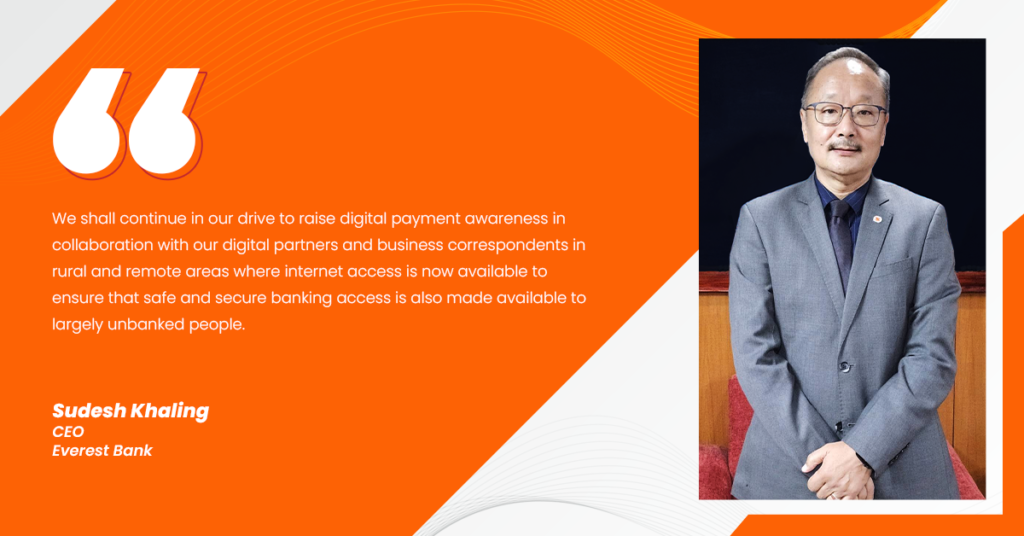
Apart from the above, we shall continue in our drive to raise digital payment awareness in collaboration with our digital partners and business correspondents in rural and remote areas where internet access is now available to ensure that safe and secure banking access is also made available to largely unbanked people.”
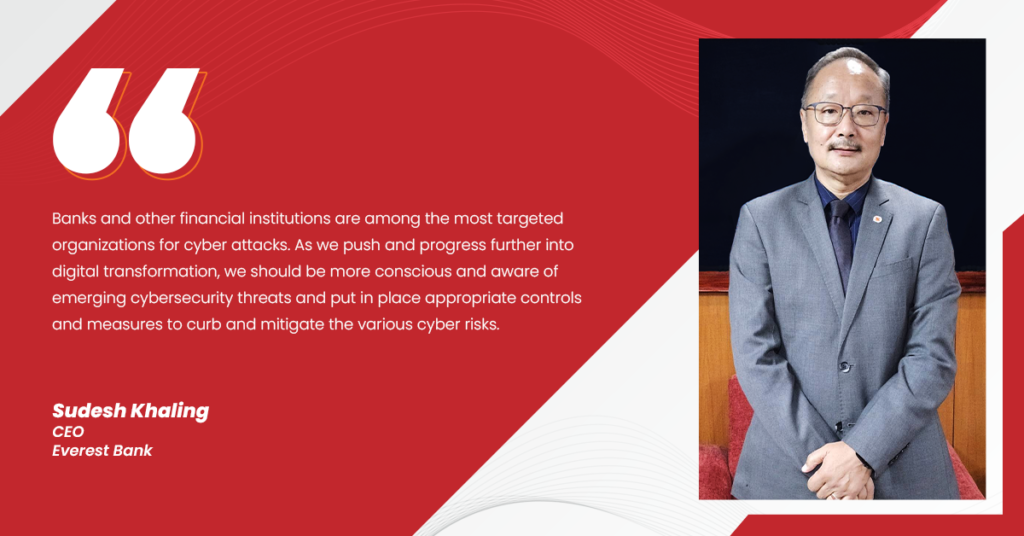
“Banks and other financial institutions are among the most targeted organizations for cyber attacks. As we push and progress further into digital transformation, we should be more conscious and aware of emerging cybersecurity threats and put in place appropriate controls and measures to curb and mitigate the various cyber risks.
Apart from the above, customer and/or bank employee behavior can put confidential customer data at risk. We have seen and heard the consequences of poor security practices from bank employees and digital banking users which resulted in leakages of critical and sensitive customer data or information. In some cases, this has also led to huge financial losses.
As part of our digital awareness campaign, we have been actively training our employees and customers on how to protect themselves and remain vigilant against cyber attacks. Everest Bank is the latest bank to embrace Foneloan. What are your thoughts on the credit scenario in our country?
The credit regime in Nepal, I would say is fairly stringent with strong provisioning norms prescribed by NRB. Whilst credit underwriting standards may vary between banks but it is mostly guided by prevailing regulatory norms. As it stands now, Nepal is considered to have the lowest NPA in the whole of South Asia
Notably, banks have started using artificial intelligence in underwriting small-ticket consumer loans from origination to disbursals. For example the recent extension of Foneloans by several banks on their digital platform.”
“We were a little late in launching Foneloan but for a good reason. Our past experience with unsecured personal loans has not been good for various reasons. But we continue to extend personal loans against salary to several corporate employees.
Competition is intense today and we understand that the customer experience is the most important differentiating factor with all other offerings remaining almost the same with most banks.
Currently, the turnaround time even for a small ticket loan is far too long. We were struggling with improving our own internal processes to make it faster and more efficient as enhancing the customer experience has always been a priority for us.
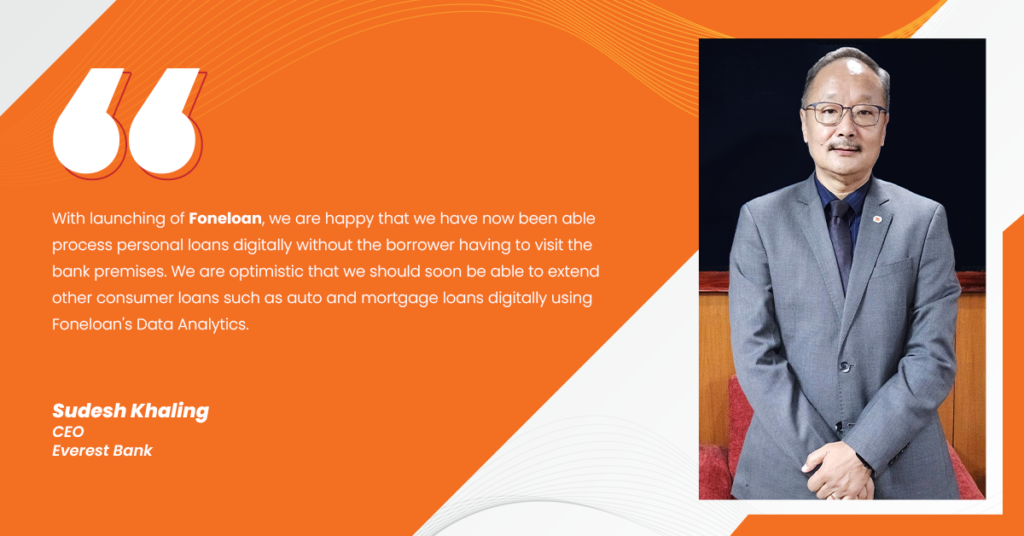
With the launching of Foneloan, we are happy that we have now been able to process personal loans digitally without the borrower having to visit the bank premises. We are optimistic that we should soon be able to extend other consumer loans such as auto and mortgage loans digitally using Foneloan’s Data Analytics. With this, we should be able to meet our customer’s expectations of the onboarding and lending process to be fast and convenient.”
Everest Bank is an A-Class institution licensed under NRB. Established in 1994, Everest Bank is a joint venture with Punjab National Bank. EBL provides services through a wide domestic network of 117 Branches, 143 ATM Counters, 31 Revenue Collection Counters, 4 Extension Counters, and many correspondents across the globe.

Jul 28, 2025

May 11, 2023